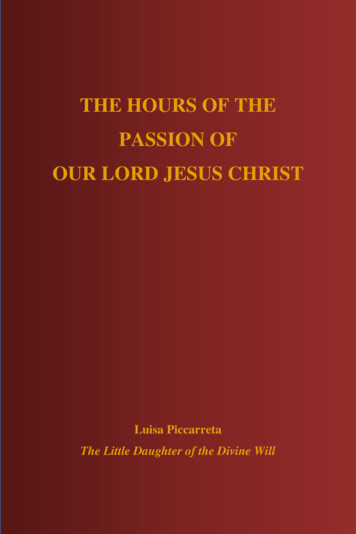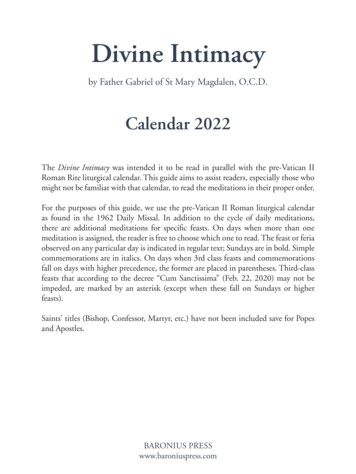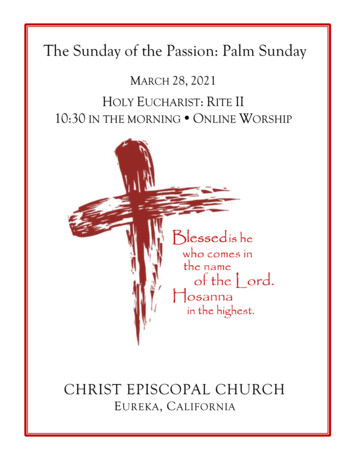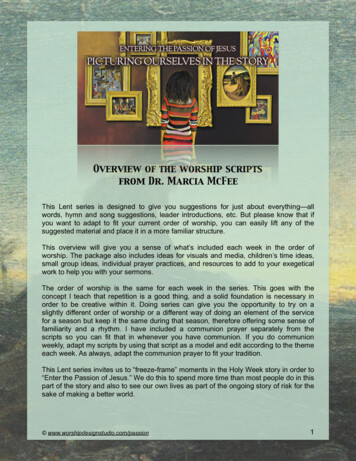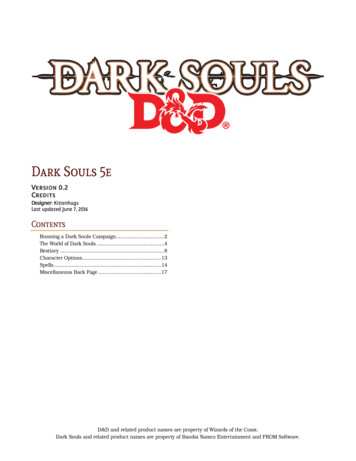
Transcription
The Passion for SoulsAuthor(s):Jowett, J. H. (1817-1893)Publisher:Grand Rapids, MI: Christian Classics Ethereal LibraryDescription:John Henry Jowett was one of the most beloved preachersof the early 20th century. His sermons boasted a fine balanceof practicality, expressiveness, and depth of knowledge;Jowett had a rare ability to relate to almost every congregantfrom his pulpit. The 1907 issue of British Weekly, after surveying its readership, ranked Jowett as Britain’s “most appealing preacher,” over and above even F.B. Meyer, G.Campbell Morgan, and others. Jowett’s The Passion for Soulsis a must-read devotional book for any Christian sharing theGospel, whether abroad, at work, or in the neighborhood.Christ called his disciples to be “fishers of men,” and Jowettreaffirms this calling for Christ’s modern disciples. He remindsChristians of what it means to live as a disciple of Jesus, andoffers relevant wisdom acquired from decades of service.Kathleen O’BannonCCEL Staffi
ContentsCover Page1Title Page3Dedication4The Passion for Souls5I. The Disciple’s Theme6II. The Disciple’s Sacrifice12III. The Disciple’s Tenderness19IV. The Disciple Watching for Souls24V. The Disciple’s Companion29VI. The Disciple’s Rest36VII. The Disciple’ Vision43Indexes48Index of Scripture References49Index of Pages of the Print Edition50ii
This PDF file is from the Christian Classics Ethereal Library, www.ccel.org. The mission ofthe CCEL is to make classic Christian books available to the world. This book is available in PDF, andotherformats.See Discuss this book online at http://www.ccel.org/node/4007.The CCEL makes CDs of classic Christian literature available around the world through theWeb and through CDs. We have distributed thousands of such CDs free in developingcountries. If you are in a developing country and would like to receive a free CD, pleasesend a request by email to cd-request@ccel.org.The Christian Classics Ethereal Library is a self supporting non-profit organization atCalvin College. If you wish to give of your time or money to support the CCEL, please visithttp://www.ccel.org/give.This PDF file is copyrighted by the Christian Classics Ethereal Library. It may be freelycopied for non-commercial purposes as long as it is not modified. All other rights are reserved. Written permission is required for commercial use.iii
Cover Page1THE PASSION FOR SOULSWORKS OFREV. J. H. JOWETT2YET ANOTHER DAY32mo, Cloth, net, 25C. Leather, net, 35c.A brief prayer for every day of the year. They drive straight to theheart as nothing that ever came from Mr. Jowett’s pen. It is an extraordinary, little book, the flower of the sweetest, open eyed loveof Christ.THE PASSION FOR SOULS16mo, Cloth, net, Soc.Seven sermons on the themes tenderness, watchfulness, companionship, rest and vision of the Apostle Paul’s passion for human souls.This little volume shows Mr. Jowett’s keen, reverent insight at itsbest.MEDITATIONS FOR QUIET MOMENTS16mo, Cloth, 50c.“Twenty-seven brief homilies on subjects of practical and immediateinterest to Christians. One’s note-book, after reading it, has manysuggestions.”—Record of Christian Work.1
Cover PageFleming H. Revell CompanyPUBLISHERS32
Title PageThe Passion for SoulsByJ. H. JOWETT, M. A.Author of “Brooks by the Traveller’s Way,” etc.NEW YORKCHICAGOTORONTOFleming H. Revell CompanyLONDONANDEDINBURGHCopyright, 1905, by4FLEMING H. REVELL COMPANYNew York: 158 Fifth AvenueChicago: 80 Wabash AvenueToronto: 27 Richmond Street, W.London: 21 Paternoster SquareEdinburgh: 100 Princes Street53
DedicationToMy Father and Mother69874
The Passion for SoulsThe Passion for Souls5
I. The Disciple’s ThemeITHE DISCIPLE’S THEME“Unto me, who am less than the least of all saints, was this grace given, to preach untothe Gentiles the unsearchable riches of Christ.”—EPH. 3: 8.Mark how the apostle describes the evangel—“the unsearchable riches of Christ!” Itsuggests the figure of a man standing, with uplifted hands, in a posture of great amazement,before continuous revelations of immeasurable and unspeakable glory. In whatever way heturns, the splendour confronts him! It is not a single highway of enrichment. There are sideways, byways, turnings here and there, labyrinthine paths and recesses, and all of themabounding in unsuspected jewels of grace. It is as if a miner, working away at the primaryvein of ore, should continually discover equally precious veins stretching out on every side,and overwhelming him in rich embarrassment. It is as if a little child, gathering the wildsweet heather at the fringe of the road, should lift his eyes and catch sight of the purple gloryof a boundless moor. “The unsearchable riches of Christ!” It is as if a man were tracking outthe confines of a lake, walking its boundaries, and when the circuit were almost completeshould discover that it was no lake at all, but an arm of the ocean, and that he was confrontedby the immeasurable sea! “The unsearchable riches of Christ!” This sense of amazement isnever absent from the apostle’s life and writings. His wonder grows by what it feeds on.Today’s surprise almost makes yesterday’s wonder a commonplace. Again and again hechecks himself, and stops the march of his argument, as the glory breathes upon him thenew freshness of the morning. You know how the familiar paean runs. “According to theriches of His grace.” “That He would grant you, according to the riches of His glory.” “Godshall supply all your need according to His riches in glory by Christ Jesus.” “The riches ofthe glory of this mystery among the Gentiles.” “The same Lord over all is rich unto all thatcall upon Him.” “In everything ye are enriched in Him.” “The exceeding riches of His grace.”His thought is overwhelmed. He is dazzled by the splendour. Speech is useless. Descriptionis impossible. He just breaks out in awed and exultant exclamation. “O, the depth of theriches both of the wisdom and knowledge of God!” The riches are “unsearchable,” untrackable, “beyond all knowledge and all thought.”But now, to the Apostle Paul, these “unsearchable riches” are not merely the subjectsof contemplation, they are objects of appropriation. This ideal wealth is usable glory, usablefor the enrichment of the race. The “unsearchable riches” fit themselves into every possiblecondition of human poverty and need. The ocean of grace flows about the shore of commonlife, into all its distresses and gaping wants, and it fills every crack and crevice to the full.That is the sublime confidence of the Apostle Paul. He stands before all the desert places inhuman life, the mere cinder-heaps, the men and the women with burnt-out enthusiasms6911
I. The Disciple’s Themeand affections, and he boldly proclaims their possible enrichment. He stands before sin, andproclaims that sin can be destroyed. He stands before sorrow, and proclaims that sorrowcan be transfigured. He stands before the broken and perverted relationships of men, andproclaims that they can all be rectified. And all this in the strength of “the unsearchableriches of Christ!” To this man the wealth is realizable, and can be applied to the removal ofall the deepest needs of men. Let us fasten our attention here for a little while, in the contemplation of this man’s amazing confidence in the triumphant powers of grace.He stands before sin and proclaims its possible destruction. It is not only that he proclaimsthe general ministry of pardon and the general removal of sin. He finds his special delightin specializing the ministry, and in proclaiming the all-sufficiency of redeeming grace in itsrelationship to the worst. There is about him the fearlessness of a man who knows that hisevangel is that of a redemption which cannot possibly fail. Turn to those gloomy catalogueswhich are found here and there in his epistles, long appalling lists of human depravity andhuman need, and from these estimate his glowing confidence in the powers of redeeminggrace. Here is such a list:—“Fornicators, idolaters, adulterers, effeminate, abusers of themselves with men, thieves, covetous, drunkards, revilers, extortioners.” Such were some ofthe foul issues upon which the saving energies of grace were to be brought. And then headds—“And such were some of you. But ye were washed!” And when the Apostle uses theword “washed” he suggests more than the washing out of an old sin, he means the removalof an old affection; more than the removal of a pimple, he means the purifying of the blood;more than the cancelling of guilt, he means the transformation of desire. Such was this man’sbelief in the saving ministry of divine grace. Do we share his confidence? Do we speak withthe same unshaken assurance, or do we stagger through unbelief? Does our speech tremblewith hesitancy and indecision? If we had here a company of men and women whose conditionmight well place them in one of the catalogues of the Apostle Paul, could we address to theman evangel of untroubled assurance, and would our tones have that savour of persuasionwhich would make our message believed? What could we tell them with firm and illuminedconvictions? Could we tell them that the cinder-heaps can be made into gardens, and thatthe desert can be made to rejoice and blossom as the rose? I say, should we stagger in thepresence of the worst, or should we triumphantly exult in the power of Christ’s salvation?It has always been characteristic of great soul-winners that, in the strength of the unsearchable riches of Christ, they have proclaimed the possible enrichment and ennoblementof the most debased. John Wesley appeared to take almost a pride in recounting and describing the appalling ruin and defilement of mankind, that he might then glory in all-sufficientpower of redeeming grace. “I preached at Bath. Some of the rich and great were present, towhom, as to the rest, I declared with all plainness of speech, (1) That by nature they wereall children of wrath. (2) That all their natural tempers were corrupted and abominable. . . One of my hearers, my Lord ——, stayed very impatiently until I came to the middle of121314157
I. The Disciple’s Thememy fourth head. Then, starting up, he said, ‘’Tis hot! ’tis very hot,’ and got downstairs asfast as he could.” My Lord —— should have stayed a little longer, for John Wesley’s analysisof depravity and of human need was only and always the preface to the introduction of theglories of the unsearchable riches of Christ. My Lord —— should have waited until Wesleygot to the marrow of his text, “The Son of Man is come to seek and to save that which waslost.”There was a similar sublime confidence in the preaching of Spurgeon. What a magnificentassurance breathes through these words, “The blood of Christ can wash out blasphemy,adultery, fornication, lying, slander, perjury, theft, murder. Though thou hast raked in thevery kennels of hell, yet if thou wilt come to Christ and ask mercy He will absolve thee fromall sin.” That too, I think, is quite Pauline. Henry Drummond has told us that he has sometimes listened to confessions of sin and to stories of ill-living so filthy and so loathsome thathe felt when he returned home that he must change his very clothes. And yet to these plaguesmitten children Drummond offered with joyful confidence the robe of righteousness andthe garment of salvation. We need this confident hope to-day. Men and women are roundabout us, will-less, heartless, hopeless, and there is something stimulating and magneticabout a strong man’s confident speech. If we proclaim the unsearchable riches of Christ, letus proclaim them with a confidence born of experimental fellowship with the Lord, andwith the untrembling assurance that the crown of life can be brought to the most besotted,and the pure white robe to the most defiled.What else does Paul find in the unsearchable riches of Christ? He finds a gracious ministryfor the transfiguration of sorrow. The unsearchable riches of Christ bring most winsomelight and heat into the midst of human sorrow and grief. “Our consolations also aboundthrough Christ.” Turn where you will, in the life of Paul, into his darker seasons and experiences, and you will find that the sublime and spiritual consolation is shedding its comfortingrays. “We rejoice in tribulations also.” Who would have expected to find the light burningthere? “We sorrow, yet not as others who have no hope.” “Not as others!” It is sorrow withthe light streaming through it! It is an April shower, mingled sunshine and rain; the hopegleams through tears. The light transfigures what it touches! Even the yew tree in my garden,so sombre and so sullen, shows another face when the sunlight falls upon it. I think I haveseen the yew tree smile!Even pain shows a new face when the glory-light beams upon it. Said Frances RidleyHavergal, that exultant singing spirit, with the frail, shaking, pain-ridden body, “Everybodyis so sorry for me except myself.” And then she uses the phrase, “I see my pain in the lightof Calvary.” It is the yew tree with the light upon it! Such is the ministry of the unsearchableriches in the night-time of pain. Professor Elmslie said to one of his dearest friends towardsthe end of his days, “What people need most is comfort.” If that be true, then the sad, tear-1617188
I. The Disciple’s Themestricken, heavy-laden children of men will find their satisfaction only in the unsearchableriches of Christ.What further discoveries does the Apostle make in the unsearchable riches of Christ?He not only confronts sin and claims that it can be destroyed, and stands before sorrow andclaims that it can be transfigured, he stands amid the misunderstandings of men, amid theperversions in the purposed order of life, the ugly twists that have been given to fellowshipswhich were ordained to be beautiful and true, and he proclaims their possible rectificationin Christ. When Paul wants to bring correcting and enriching forces into human affairs, heseeks the wealthy energy in “the unsearchable riches of Christ” He finds the ore for all ethical and social enrichments in this vast spiritual deposit. He goes into the home, and seeksthe adjustment of the home relationships, and the heightening and enrichment of the marriage vow. And by what means does he seek it? By bringing Calvary’s tree to the veryhearthstone, the merits of the bleeding sacrifice to the enrichment of the wedded life.“Husbands, love your wives, as Christ also loved the Church and gave Himself for it” Hegoes into the domain of labour, and seeks the resetting of the relationships of master andservant. And by what means does he seek it? By seeking the spiritual enrichment of bothmaster and servant in a common communion with the wealth of the blessed Lord. He takesour common intimacies, our familiar contracts, the points where we meet in daily fellowship,and he seeks to transform the touch which carries an ill contagion into a touch which shallbe the vehicle of contagious health. And by what means does he seek it? By bringing theCross to the common life and letting the wealth of that transcendent sacrifice reveal thework of the individual soul. Everywhere the Apostle finds in the “unsearchable riches ofChrist” life’s glorious ideal, and the all-sufficient dynamic by which it is to be attained. Here,then, my brethren, are the “unsearchable riches” of Christ—riches of love, riches of pardon,riches of comfort, riches of health, riches for restoring the sin-scorched wastes of the soul,riches for transfiguring the sullenness of sorrow and pain, and riches for healthily adjustingthe perverted relationships of the home, the state and the race. These riches are ours. Everysoul is heir to the vast inheritance! The riches are waiting for the claimants! And some, yea,multitudes of our fellows have claimed them, and they are moving about in the humdrumways of common life with the joyful consciousness of spiritual millionaires. One such manis described by James Smetham. He was a humble member of Smetham’s Methodist classmeeting. “He sold a bit of tea . . . and staggered along in June days with a tendency to hernia,and prayed as if he had a fortune of ten thousand a year, and were the best-off man in theworld!” His “bit of tea” and his rupture! But with the consciousness of a spiritual millionaire!“All this,” said the old woman to Bishop Burnett, as she held up a crust, “all this and Christ!”These are the folk who have inherited the promises, who have even now inherited thetreasures in heaven: and “unto me, who am less than the least of all saints, is this grace given,to preach these unsearchable riches of Christ.”9192021
I. The Disciple’s ThemeLet me turn, in conclusion, from the disciple’s theme to the preacher himself. “Untome, who am less than the least of all saints.” Then the disciple is possessed by a sense ofprofound humility. “Unto me”—the standing amazement of it, that he should have beenchosen, first, to share the wealth, to claim the inheritance, and then to make known hisdiscovery to others. “Unto me, who am less than the least”—he violates grammar, he coinsa word which I suppose is used nowhere else. It is not enough for Paul to obtain a wordwhich signifies the least, he wants a place beneath the least—“unto me, who am less thanthe least”—such a word does he require in order to express his sense of his own unworthiness.“Less than the least.” He gazes back; surely I don’t misinterpret the Apostle when I say it—hegazes back upon the days of his alienation, upon the days when he was deriding and scorningthe supposed riches of his Master’s kingdom. Again and again, in places where I least expectit, I find the Apostle turning a powerful and, I think, pain-ridden gaze into those early dayswhen he lived in revolt. If you turn to Romans 16, that collection of miscellanies, a chapterwhich I suppose we don’t often read, which is concerned largely with salutations and thecourtesies of common life, you get here and there most vivid glimpses into the consciousnessof the Apostle. Here is one: “Salute Andronicus, and Junia, my kinsmen, and my fellowprisoners who were in Christ before me.” Do you feel the sob of it—“who were in Christbefore me”? They were serving Him, following Him, proclaiming Him, while I was still adeclared and implacable foe; they were in Christ before me. But unto me, less than Andronicus, less than Junia, and less than the least of all, unto me was the grace given. I thinkwe shall have to share it with him—this sense of unworthiness at being called and electedby grace to preach the Gospel. We shall have to enter into controversy even with the oldPuritan who said, “I do not quarrel with Paul’s language, but I do dispute his right to pushme out of my place.” “Less than the least,” said the Puritan, “is my place.” Surely thepreacher must sometimes lay down his pen, and pause in the very middle of his preparation,in a sense of extreme wonderment that the condescending Lord should have chosen him tobe the vehicle and messenger of eternal grace. The man who feels unworthy will be keptopen and receptive towards the fountain. “Why did Jesus choose Judas? “said an inquireronce to Dr. Parker. “I don’t know,” replied the Doctor, “but I have a bigger mystery still. Icannot make out why He chose me.” “Unto me, who am less than the least of all saints wasthis grace given.” I wish I could just read that in the very tone and accent in which I thinkthe Apostle himself would have proclaimed it. I think the early part of it would have to beread almost tremblingly. Mark the mingling of profound humility with the tone of absoluteconfidence. When the Apostle looked at himself he was filled with shrinkings and timidities,but when he thought about his acceptance and his endowment he was possessed by confidenttriumph. Whatever shrinking he had about himself, he had no shrinking that he was theelect of God, endowed with the grace of God, in order to proclaim the evangel of God. Itwas just because he was so perfectly assured of his acceptance and of his vocation that he10222324
I. The Disciple’s Themefelt so perfectly unworthy. Did not Cromwell say of George Fox that an enormous sacredself-confidence was not the least of his attainments? I am not quite sure that Oliver Cromwellcorrectly interpreted George Fox. I would be inclined to withdraw the word “self” and insertthe word “God,” and then we have got, not only what George Fox ought to be, but what theApostle Paul was, and what every minister of the Gospel is expected to be in Christ; we areexpected to be the children of an enormous God-confidence, we are to be children absolutelyassured that we are in communion with Christ, and are even now receptive of His grace.“Unto me was the grace given.” Without that grace there can be no herald, and withoutthat grace there can, therefore, be no evangel. You have heard the old legend of the noblehall, and the horn that hung by the gate waiting for the heir’s return; none could blow thehorn except the heir to the noble pile. One stranger after another would come and put thehorn to his lips, but fail to sound the blast. Then the heir appeared, took the horn downfrom the gate, blew it, and there came the blast that rang down the valley and wound roundthe hills. “Unto me was the grace given” to blow the horn; “unto me was the grace given”to preach; and none but the one who has the grace of the heir can blow the horn of theGospel. Our main work, our supreme work, our work, before which all other pales and becomes dim, is to tell the good news, to go everywhere, letting everybody know about theunsearchable riches of Christ. When Professor Elmslie was dying, he said to his wife, “Noman can deny that I have always preached the love of God”; and just before he died he saidagain, “Kate, God is love, all love. Kate, we will tell everybody that, but especially our ownboy—at least, you will—we will tell everybody that; that’s my vocation.” That is the vocationof the disciple, to tell everybody of the unsearchable riches of Christ.25262711
II. The Disciple’s SacrificeIITHE DISCIPLE’S SACRIFICE“I fill up that which is behind of the afflictions of Christ.”—COLOSSIANS 1: 24.“I FILL up that which is behind!” Not that the ministry of reconciliation is incomplete.Not that Gethsemane and Calvary have failed. Not that the debt of guilt is only partiallypaid, and there is now a threatening remnant which demands the sacrifice of human blood.The ministry of atonement is perfected. There is no outstanding debt. “Jesus paid it all.” Inthe one commanding sacrifice for human sin Calvary leaves nothing for you and me to do.In the bundle of the Saviour’s sufferings every needful pang was borne.Bearing shame and scoffing rude,In my place condemned He stood,Sealed my pardon with His blood.I can add nothing to that. There is nothing lacking. The sacrifice is all sufficient.And yet “I fill up that which is behind of the sufferings of Christ.” The sufferings needa herald. A story needs a teller. A gospel requires an evangelist. A finished case demandsefficient presentation. The monarch must repeat himself through his ambassadors. Theatoning Saviour must express Himself through the ministering Paul. The work of Calvarymust proclaim itself in the sacrificial saints. In his own sphere, and in his own degree, Paulmust be Christ repeated. As a minister in Greece and Asia Minor Paul must reincarnate thesacrificial spirit of Jerusalem and Galilee. He must “fill up that which is behind in the sufferings of Christ.” The suggestion is this—all ministry for the Master must be possessed by thesacrificial spirit of the Master. If Paul is to help in the redemption of Rome he must himselfincarnate the death of Calvary. If he is to be a minister of life he must “die daily.” “The bloodis the life.” Without the shedding of blood there is no regenerative toil. Every real lift impliesa corresponding strain, and wherever the crooked is made straight “virtue” must go out ofthe erect. The spirit of Calvary is to be reincarnated in Ephesus and Athens and Rome andLondon and Birmingham; the sacrificial succession is to be maintained through the ages,and we are to “fill up that which is behind in the sufferings of Christ.”“I fill up that which is behind”! That is not the presumptuous boast of perilous pride;it is the quiet, awed aspiration of privileged fellowship with the Lord. Here is an Apostle, aman who thinks meanly enough of himself, counting himself an abortion, regarding himselfas “the least of the apostles, not worthy to be called an apostle,” and yet he dares to whisperhis own name alongside his Master’s, and humbly to associate his own pangs with the sufferings of redemptive love. “I fill up that which is behind of the sufferings of Christ.” Is theassociation permissible? Are the sufferings of Christ and His Apostles complementary, and122829
II. The Disciple’s Sacrificeare they profoundly cooperative in the ministry of salvation? Dare we proclaim them together?Here is an association. “In all their afflictions He was afflicted.” “Who is weak and I amnot weak; who is offended and I burn not?” Is the association alien and uncongenial, or isit altogether legitimate and fitting? “In all their afflictions He was afflicted”—the deep,poignant, passionate sympathy of the Saviour; “Who is weak and I am not weak”—the deep,poignant, passionate sympathy of the ambassador. The kinship in the succession is vital.The daily dying of the Apostle corroborates and drives home the one death of his Lord. Thesuffering sympathies in Rome perfected the exquisite sensitiveness in Galilee and Jerusalem.The bleeding heart in Rome perfected the ministry of the broken heart upon the Cross. Paul“filled up that which was behind of the sufferings of Christ.”Here, then, is a principle. The gospel of a broken heart demands the ministry of bleedinghearts. If that succession be broken we lose our fellowship with the King. As soon as wecease to bleed we cease to bless. When our sympathy loses its pang we can no longer be theservants of the passion. We no longer “fill up the sufferings of Christ,” and not to “fill up”is to paralyze, and to “make the cross of Christ of none effect.” Now the apostle was a manof the most vivid and realistic sympathy. “Who is weak and I am not weak?” His sympathywas a perpetuation of the Passion. I am amazed at its intensity and scope. What a broad,exquisite surface of perceptiveness he exposed to the needs and sorrows of the race! Whereverthere was a pang it tore the strings of his sensitive heart. Now it is the painful fears andalarms of a runaway slave, and now the dumb, dark agonies of people far away. The Apostlefelt as vividly as he thought, and he lived through all he saw. He was being continuallyaroused by the sighs and cries of his fellow men. He heard a cry from Macedonia, and thepain on the distant shore was reflected in his own life. That is the only recorded voice, buthe was hearing them every day, wandering, pain-filled, fear-filled voices, calling out of thenight, voices from Corinth, from Athens, from Rome also, and from distant Spain!” Whois weak and I am not weak?” He was exhausted with other folk’s exhaustion, and in theheavy burdensomeness he touched the mystery of Gethsemane, and had fellowship withthe sufferings of his Lord.My brethren, are we in this succession? Does the cry of the world’s need pierce the heart,and ring even through the fabric of our dreams? Do we “fill up” our Lord’s sufferings withour own sufferings, or are we the unsympathetic ministers of a mighty Passion? I am amazedhow easily I become callous. I am ashamed how small and insensitive is the surface whichI present to the needs and sorrows of the world. I so easily become enwrapped in the softwool of self-indulgency, and the cries from far and near cannot reach my easeful soul. “Whydo you wish to return?” I asked a noble young missionary who had been invalided home:“Why do you wish to return?” “Because I can’t sleep for thinking of them!” But, my brethren,13303132
II. The Disciple’s Sacrificeexcept when I spend a day with my Lord, the trend of my life is quite another way. I cannotthink about them because I am so inclined to sleep! A benumbment settles down upon myspirit, and the pangs of the world awake no corresponding sympathy. I can take my newspaper, which is ofttimes a veritable cup-full of horrors, and I can peruse it at the breakfasttable, and it does not add a single tang to my feast. I wonder if one who is so unmoved canever be a servant of the suffering Lord!Here in my newspaper is the long, small-typed casualty list from the seat of war; or hereis half a column of the crimes and misdemeanours of my city; or here is a couple of columnsdescriptive of the hot and frantic doings of the race-course; or here is a small corner paragraph telling me about some massacres in China; or here are two little hidden lines sayingthat a man named James Chalmers has been murdered in New Guinea! And I can read itall while I take my break fast, and the dark record does not haunt the day with the mingledwails of the orphaned and the damned. My brethren, I do not know how any Christianservice is to be fruitful if the servant is not primarily baptized in the spirit of a sufferingcompassion. We can never heal the needs we do not feel. Tearless hearts can never be theheralds of the Passion. We must pity if we would redeem. We must bleed if we would bethe ministers of the saving blood. We must perfect by our passion the Passion of the Lord,and by our own suffering sympathies we must “fill up that which is behind in the sufferingsof Christ.” “Put on, therefore, as God’s elect, a heart of compassion.”Here is another association. Can we find a vital kinship? “He offered up prayers andsupplications with strong crying and tears.” So far the Master. “I would have you know howgreatly I agonize for you.” So far the Apostle. The Saviour prayed
THE PASSION FOR SOULS 2 WORKS OF REV. J. H. JOWETT YET ANOTHER DAY 32mo, Cloth, net, 25C. Leather, net, 35c. A brief prayer for every day of the year. They drive straight to the heart as nothing that ever came from Mr. Jowett’s pen. It is an ex-traordinary, little book, the flower of the sweetest, open eyed love o




